What we do
MSF focuses on emergency, paediatric, and maternal healthcare in Afghanistan, which has one of the highest maternal mortality rates in the world.
We work in one hospital in Helmand province in collaboration with the Ministry of Public Health. We also run a maternity hospital in rural Khost province, a drug-resistant tuberculosis programme in Kandahar, and a trauma centre in Kunduz. We treat malnourished children, who have been displaced, in Herat province.
Major attacks on MSF hospitals have occurred in recent years; in October 2015, US airstrikes destroyed our trauma centre in Kunduz, killing 42 people. An armed group attacked our maternity wing at Dasht-e-Barchi hospital in Kabul in May 2020, with 16 mothers and an MSF midwife among those killed. In the wake of the attack, we made the difficult decision to withdraw from the hospital in Kabul, leaving women in the area without critically-needed emergency obstetric care.
In August 2021, the Islamic Emirate of Afghanistan (also known as the Taliban) entered the city of Kabul as the government collapsed. MSF teams have stayed in place and continue to provide care.
- Afghanistan
People struggle to access medical care in Afghanistan, where – even as the government has collapsed and uncertainty has set in – we remain to address people’s needs.
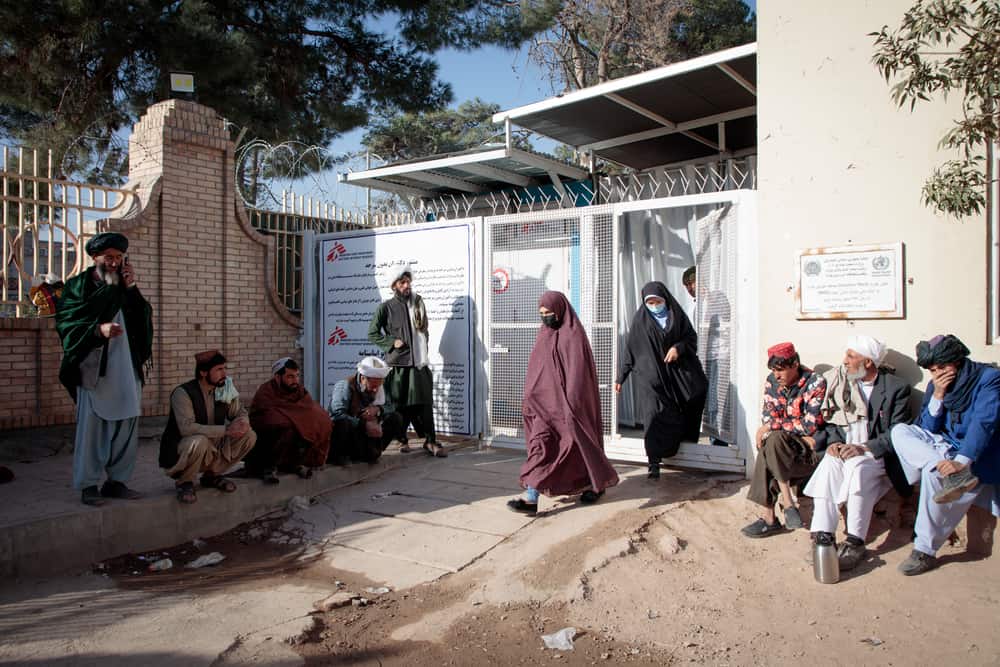
What are we doing in Afghanistan?
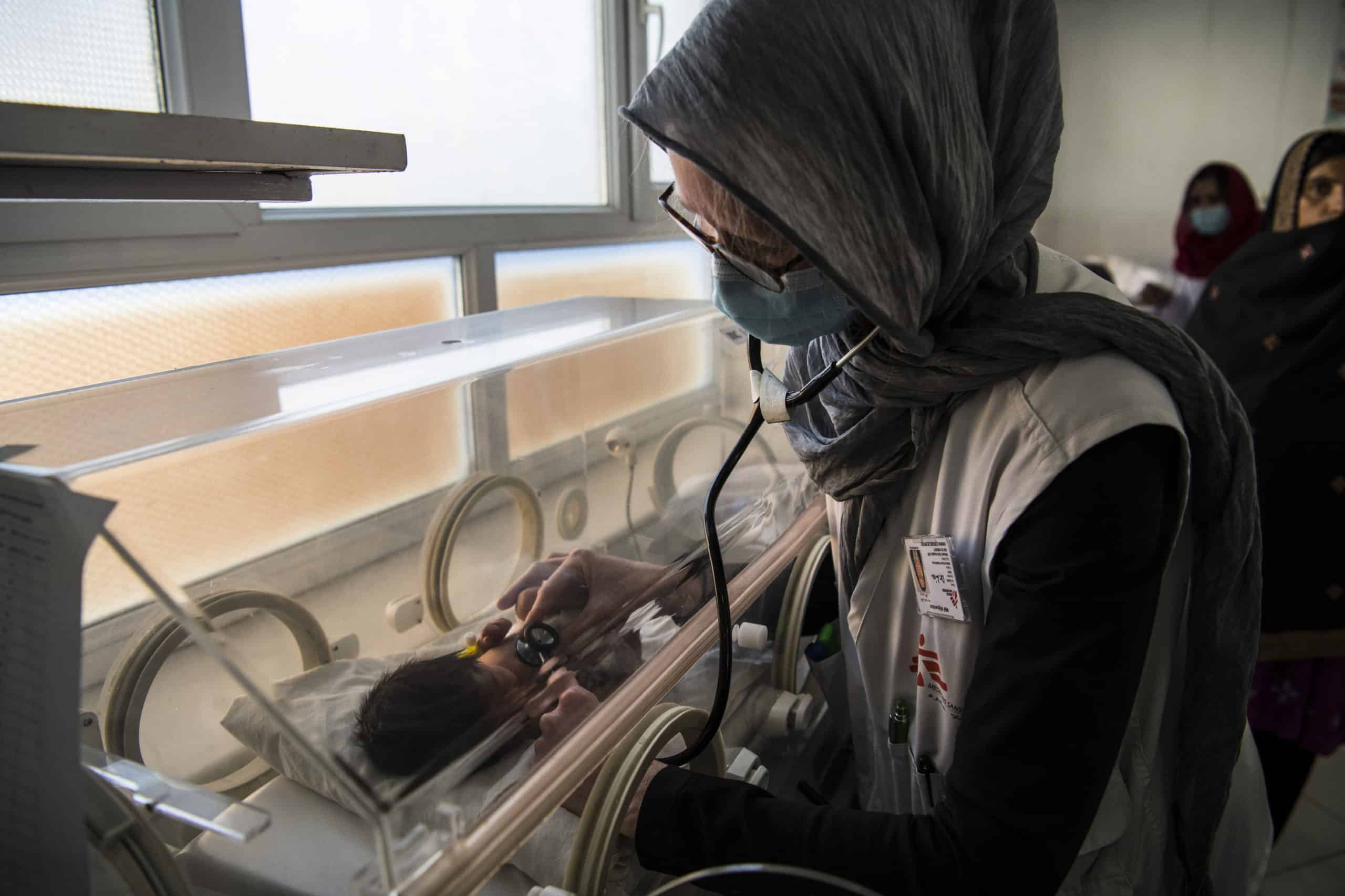
Maternal healthcare
By providing free, high quality maternal and neonatal healthcare in two hospitals in Helmand and Khost provinces, we aim to help reduce death and sickness in mothers and their newborns in one of the most dangerous places in the world to give birth. Training medical staff is an integral and important part of our projects. We place an emphasis on training local female staff through our projects in Afghanistan. Almost all the midwives are Afghan women, some of whom have become highly experienced in managing complicated deliveries since we opened our maternity hospital in Khost in 2012.
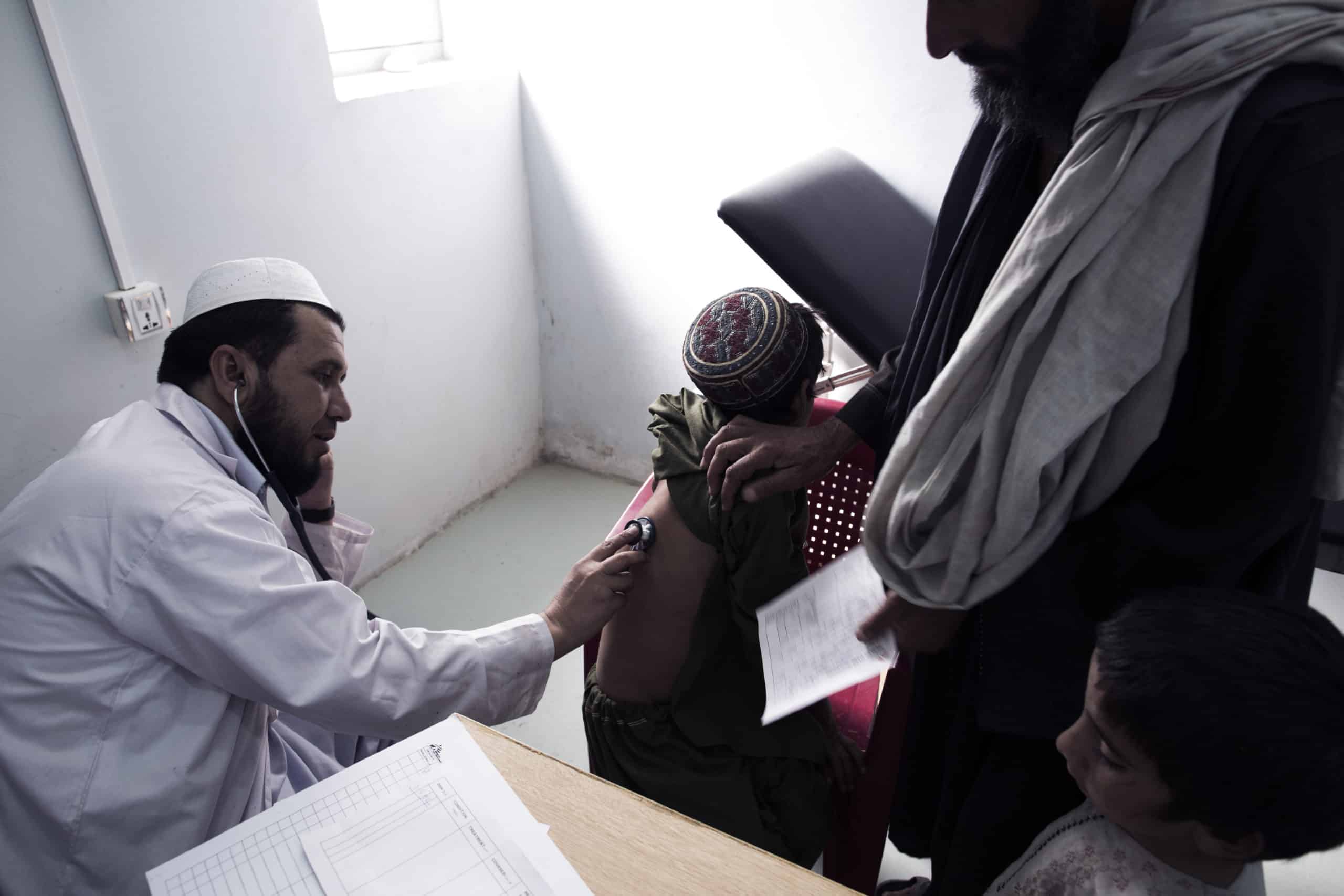
Tuberculosis treatment
We support the diagnosis and treatment of drug-resistant tuberculosis. In Kandahar province, in the south of the country, we run a laboratory, as well as facilities for hosting patients during their treatment. In December 2019, we introduced a nine-month oral regimen allowing DR-TB patients to change from injectable drugs to pills and reduce their number of consultations at the hospital. The shorter, all-oral treatment produces fewer side effects and improves the patients’ quality of life. We also provide support to Mirwais regional hospital, and organise training for other facilities in Kandahar to improve the detection of TB, including drug-sensitive cases.
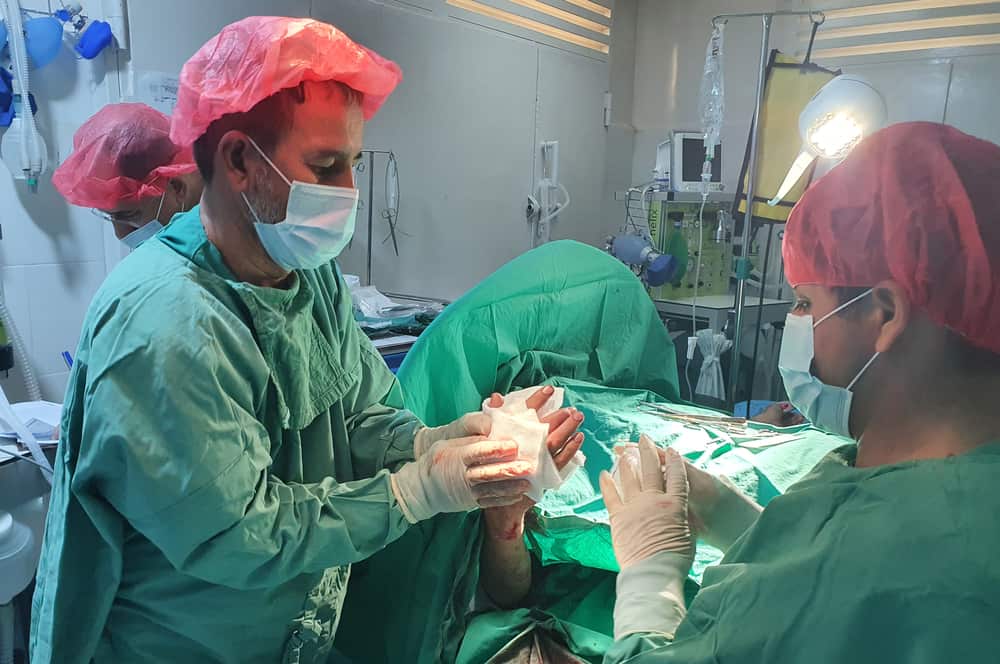
Trauma care
We opened a new 30-bed trauma centre in Kunduz in August 2021. The centre treats people with trauma injuries, for example, as a result of road traffic accidents, and people injured in the fighting who have complications.
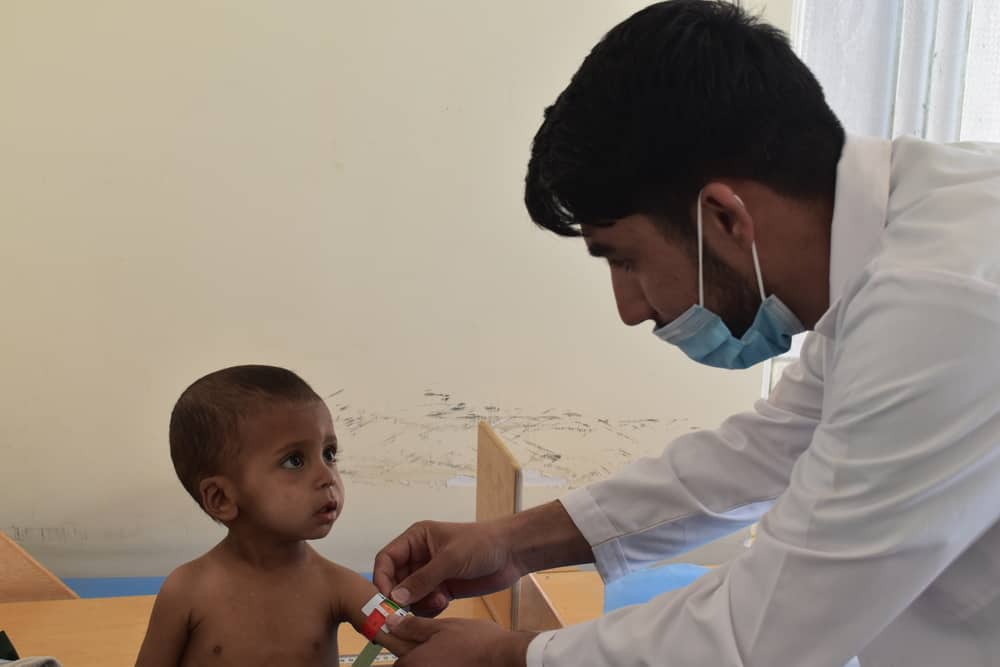
Treating malnutrition
In both Herat and Helmand provinces, we treat malnourished children in inpatient therapeutic feeding centres; those coming to the centre at the regional hospital in Herat have often travelled some distance to get there.
In 2022
Médecins Sans Frontières (MSF) runs a range of projects in Afghanistan, responding to the immense medical needs caused by decades of conflict and political upheaval, particularly among women and children.
When the Islamic Emirate of Afghanistan, also known as the Taliban, entered the capital, Kabul, and took over power on 15 August 2021, foreign development funding was cut overnight. Afghan assets held in the US and in some other foreign countries were frozen and many international organisations left the country. This added more pressure to an already fragile, over-burdened public health system, making it increasingly difficult for people to obtain healthcare.
Although the security situation improved in 2022, and it generally became easier for people to travel to health facilities, many Afghans still faced huge challenges in accessing care. In a broken economy, many could not afford hospital visits, while for women, there were the additional barriers of the limitations placed on their freedom of movement, access to education and work. Consequently, many people delayed seeking assistance until they had no other option.
In 2022, we saw an increase in the number of people coming to our facilities, possibly due to the lack of free, local medical services and the fact that travel was safer. We ran seven projects in seven provinces, maintaining a strong focus on providing specialised healthcare. MSF also carried out an emergency response after a 5.9 magnitude earthquake hit Paktika and Khost provinces on 22 June. Our teams provided medical and logistical materials to the affected area, and set up outpatient and inpatient clinics for women and children, as well as for patients with trauma injuries or acute watery diarrhoea.
Lashkar Gah
MSF supports the 340-bed Boost hospital in Lashkar Gah, Helmand province, offering a wide range of medical services, including maternal and paediatric healthcare and surgery. In 2022, there was a 32 per cent increase in patients admitted to the hospital compared to the previous year. This increase can be attributed primarily to the fact that many health facilities in remote districts of Helmand suspended or limited their activities due to a lack of funding, medical supplies and qualified healthcare workers. Many people were forced to travel to Lashkar Gah to receive care as a result.
Kunduz
MSF’s Kunduz trauma centre has an emergency room, intensive care unit (ICU), inpatient and outpatient departments, and two operating theatres. The majority of admissions to the centre are for trauma incurred in accidents, but we also provide care to people with violence-related injuries, such as explosions.
Our team in Kunduz reported that seriously injured patients sometimes took more than seven hours to reach the centre. Such long delays can be very detrimental to patient outcomes, and speak not only to the limited referral and trauma care services in Kunduz, but also to poor road infrastructure in rural communities.
In November, MSF opened a heath post in Chardara district, to respond to gaps in local healthcare, including nutrition support and routine vaccination services.
Kabul
In the capital, we supported Maiwand teaching hospital by carrying out renovation work on the paediatric department and opening two new facilities: a 28-bed measles ward in February and a 34-bed inpatient therapeutic feeding centre (ITFC) in July.
We continued our collaboration with the Afghan Midwives Association’s pilot project by providing funding and technical support for deliveries, ante- and postnatal care, and family planning.
Khost
In Khost, MSF runs a dedicated hospital offering neonatal and maternal care, with a special focus on complicated deliveries. The hospital has a 60-bed maternity unit, a 28-bed neonatal unit and two operating theatres.
In 2022, we also supported eight local health centres across the province, providing medicines and funding for additional midwives, so that women with no risk factors for obstetric complications could give birth closer to home. In addition, MSF donated medicines and other supplies to Khost provincial hospital.
Kandahar
Activities in Kunduz were hard hit by COVID-19 and they were all suspended in April. However, construction of the new trauma centre resumed in September, with increased infection prevention and control measures to guard against the virus. Stabilisation activities in Chardara for patients with trauma injuries are due to resume in early 2021. The wound care clinic will not reopen.
Herat
In Herat regional hospital, MSF support the paediatric department’s triage, emergency room, ICU, ITFC, and hospitalization ward. Over the course of 2022, we screened and admitted thousands of patients for emergency care. The main reasons for admission were infections of the central nervous system, such as meningitis, and for septic shock, sepsis and pneumonia.
The total number of admissions to the hospital’s ITFC increased by 42 per cent in 2022 compared to 2021. Almost 50 per cent of patients were younger than six months old. Meanwhile, in camps for displaced people, we treated pregnant and lactating women, and children with moderate acute malnutrition, as well as providing general healthcare, in Kahdestan outpatient clinic.
Bamyan
In March, MSF started a new project in Bamyan province to support the provincial hospital with staff, donations of medications, isolation ward management and COVID-19 response.
We also completed the first phase of an assessment in three districts – Shibar, Saighan and Yakawlang – and the construction of eight community health facilities in Sar-e-Tarnook, Baghalak, Dar-e-Ali, Band-e-Amir, Pusht-e-Waz, Amrut, Baghak, and Jalmish.
OUR ACTIVITIES IN 2022
-
Related:
- Afghanistan
- MSF in Afghanistan











